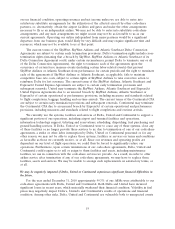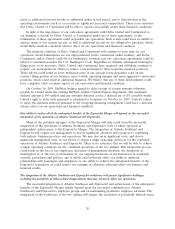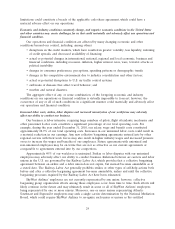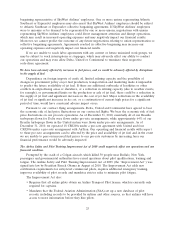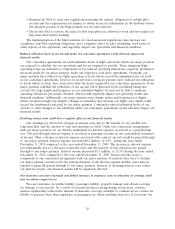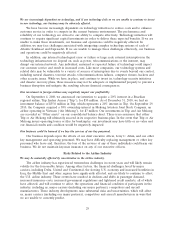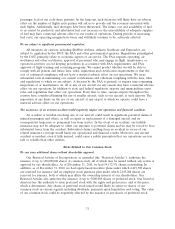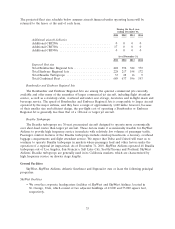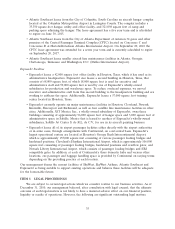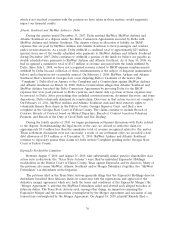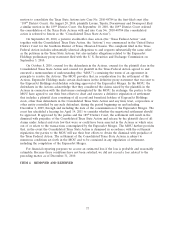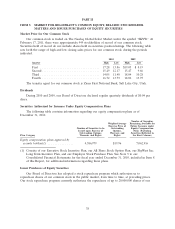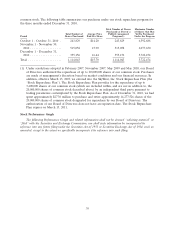SkyWest Airlines 2010 Annual Report Download - page 33
Download and view the complete annual report
Please find page 33 of the 2010 SkyWest Airlines annual report below. You can navigate through the pages in the report by either clicking on the pages listed below, or by using the keyword search tool below to find specific information within the annual report.We are increasingly dependent on technology, and if our technology fails or we are unable to continue to invest
in new technology, our business may be adversely affected.
We have become increasingly dependent on technology initiatives to reduce costs and to enhance
customer service in order to compete in the current business environment. The performance and
reliability of our technology are critical to our ability to compete effectively. Technology initiatives will
continue to require significant capital investments in order to deliver these expected benefits. If we are
unable to make these investments, our business and operations could be negatively affected. In
addition, we may face challenges associated with integrating complex technology systems of each of
Atlantic Southeast and ExpressJet. If we are unable to manage these challenges effectively, our business
and operations could be negatively affected.
In addition, any internal technological error or failure or large scale external interruption in the
technology infrastructure we depend on, such as power, telecommunications or the internet, may
disrupt our internal network. Any individual, sustained or repeated failure of technology could impact
our customer service and result in increased costs. Like most companies, our technology systems and
related data may be vulnerable to a variety of sources of interruption due to events beyond our control,
including natural disasters, terrorist attacks, telecommunications failures, computer viruses, hackers and
other security issues. While we have in place, and continue to invest in, technology security initiatives
and disaster recovery plans, these measures may not be adequate or implemented properly to prevent a
business disruption and mitigate the resulting adverse financial consequences.
Our investment in foreign airlines may negatively impact our profitability.
On September 4, 2008, we announced our intention to acquire a 20% interest in a Brazilian
regional airline, Trip Linhas Aereas (‘‘Trip’’), for $30 million. As of December 31, 2010, we had an
investment balance of $35.0 million in Trip, which represents a 20% interest in Trip. On September 29,
2010, the Company acquired a 30% ownership interest in Mekong Aviation Joint Stock Company, an
airline operating in Vietnam (‘‘Air Mekong’’), for $7 million. Our investments in Trip and Air Mekong
are recorded as ‘‘Other assets’’ on our consolidated balance sheet. There is no assurance that either
Trip or Air Mekong will ultimately succeed in its respective business plan. In the event that Trip or Air
Mekong incurs operating losses or files for bankruptcy, our investment may have little or no value and
our financial results and condition would be negatively impacted.
Our business could be harmed if we lose the services of our key personnel.
Our business depends upon the efforts of our chief executive officer, Jerry C. Atkin, and our other
key management and operating personnel. We may have difficulty replacing management or other key
personnel who leave and, therefore, the loss of the services of any of these individuals could harm our
business. We do not maintain key-man insurance on any of our executive officers.
Risks Related to the Airline Industry
We may be materially affected by uncertainties in the airline industry.
The airline industry has experienced tremendous challenges in recent years and will likely remain
volatile for the foreseeable future. Among other factors, the financial challenges faced by major
carriers, including Delta, United and Continental, the slowing U.S. economy and increased hostilities in
Iraq, the Middle East and other regions have significantly affected, and are likely to continue to affect,
the U.S. airline industry. These events have resulted in declines and shifts in passenger demand,
increased insurance costs, increased government regulations and tightened credit markets, all of which
have affected, and will continue to affect, the operations and financial condition of participants in the
industry, including us, major carriers (including our major partners), competitors and aircraft
manufacturers. These industry developments raise substantial risks and uncertainties, which will affect
us, major carriers (including our major partners), competitors and aircraft manufacturers in ways that
we are unable to currently predict.
29


